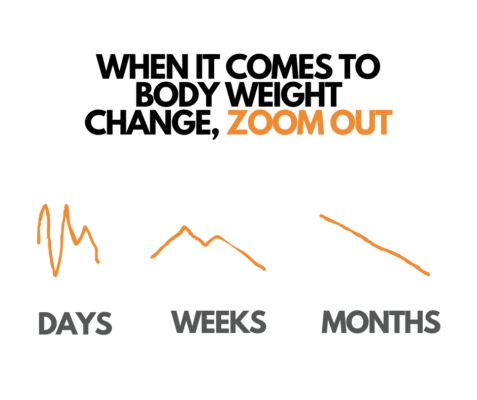You jump on the scales and hey presto, 2 lb down, smiles all around. The following week, you weigh in and you’ve gained 3 lb. disaster. All that hard work wasted and you throw in the towel. Sound familiar?
If changing your body weight is the goal, the best thing to do is zoom out.

Weight loss is NEVER linear. It will be up and down like the Nemesis at Alton Towers. If you understand and accept this from the start, you’ll less likely throw in the towel WHEN the scales don’t go the way you want.
Why is weight loss never linear?
There are so many factors that affect body weight. I myself can fluctuate 3-5lb from week to week. Below I’ve listed 8 main factors that can affect scale weight.
- Carbohydrate: Our bodies can store between 400-800 grams of glycogen (the stored form of carbohydrate) in our muscles and liver. For every gram of carbohydrate that we store, we retain 2.5-4 grams of water in our body. This is why we can see rapid weight loss in an individual when they eat very little carbohydrate and do lots of training in a short period of time.
- Sodium: A diet high in sodium (salt) could lead to short-term weight gain due to fluid retention.
- Hydration: Our bodies are roughly 50-65% water, so our hydration levels will have a direct impact on scale weight.
- Fibre Intake: Fibre intake is key to digestive health and stool transit time. Too low fibre may result in frequent toilet visits resulting in a drop in scale weight, too high fibre may create a sluggish digestive system resulting in weight gain. Our recommendations for fibre intake are as follows:
– Women 30-35g per day
– Men 40-45g per day
- Menstrual Cycle: Women will retain most water around the luteal phase (day 15 of a 28 day cycle), increasing scale weight. A way around this would be to compare scale weight at the same point in the menstrual cycle each month.
- Training: In the short term, training can increase water retention through inflammation. The healing process of inflammation which may result from a bout of training,
- Illness: Illness and disease can bring unexpected weight change. If you lose your appetite or retain water it may tip the scale one way of the other
So what do we recommend?
- Weigh in once per week, same day and same time, ideally first thing in the morning before you have eaten. Approach the weigh in purely as data collection. Then look at the trend over a number of weeks (I.e zoom out)
- Assess your weight using other methods;
- Take photos of yourself
- Circumference measurements (Thigh, hips, waist, chest & arms)
- How do your clothes fit and feel
If you are struggling with your weight please reach out, we are here to help.
Book a free consultation
Leave your details and we’ll get in touch to arrange a consultation to discuss your goals.






